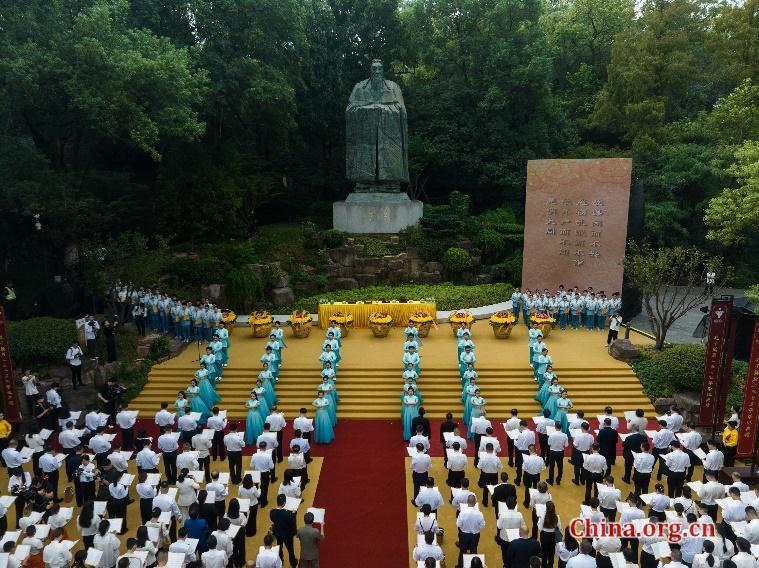
 0 Comment(s)
0 Comment(s) Print
Print E-mail chinadaily.com.cn, October 7, 2024
E-mail chinadaily.com.cn, October 7, 2024

A ceremony is held to commemorate the 2,575th anniversary of the birth of Confucius in Quzhou, Zhejiang province, on Sept. 28, 2024. [Photo by Xu Jun/China.org.cn]
Recently, I had the privilege of attending the anniversary celebration of Confucius' birth in Quzhou, located in China's southern province of Zhejiang. The city is known to be a crossroads; the Qu even means this, being a hub for four provinces. This event, which holds deep cultural and philosophical significance, was an eye-opening experience into the heart of Chinese tradition and the enduring legacy of Confucianism.
The city is closely linked to the Confucian lineage, as it is home to the descendants of Confucius, with the 76th of his decadents taking part in the ancient procession. The city plays a unique role in keeping the philosopher's teachings alive, making it the perfect setting for such a commemoration. As I entered the beautifully preserved ancestral temples and heritage sites dedicated to Confucius, I was struck by the reverence with which this ancient figure is still celebrated today.
The atmosphere was filled with a palpable sense of respect and ceremony. Participants, many of them local scholars and descendants of Confucius, were dressed in traditional Chinese robes, contributing to the sense of continuity between past and present. A series of ritual performances and prayers were offered, connecting modern society with the ideals Confucius championed over two millennia ago.
This experience provided me with invaluable insights into Confucianism; exploring the museums and talking to locals, it provided me a great insight into this philosophy that emphasizes moral integrity, social harmony and respect for one's elders and ancestors. The principles of Confucianism continue to influence Chinese society, shaping interpersonal relationships, governance, and even education. I was fascinated to learn that while modern China has undergone rapid economic and technological transformation, it has not abandoned the cultural values that have been central to its identity for centuries.
Beyond the ritual, there were numerous discussions and presentations by Confucian scholars on how these ancient teachings are interpreted in the context of today's society. From ideas about filial piety to the importance of ethical governance, I realized that Confucianism isn't just a relic of the past but remains a living philosophy, offering guidance on how to navigate the complexities of modern life.
What struck me most was how seamlessly the old traditions coexist with modernity in China. While the country is rapidly advancing in terms of technology and global influence, it still places immense value on its historical roots. The Confucius anniversary celebrations were not just about honoring the past but also about preserving a philosophy that continues to enrich the present.
My time in Quzhou reminded me that while change is inevitable, traditions like Confucianism offer a sense of continuity and grounding. This experience was a profound reminder of the cultural depth of China, and how its people are committed to upholding their rich heritage while navigating a fast-paced, modern world.
As I left Quzhou, I carried with me a deeper understanding of Confucius' enduring relevance, not just for China, but for anyone seeking wisdom and moral clarity in a changing world.